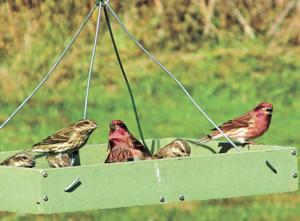Science
Urban Plants Adapt: Evolution in City Environments Revealed

Research indicates that urbanization is not solely detrimental to local ecosystems; in fact, certain plant species are evolving to thrive in city environments. A recent study published in the journal *Nature Ecology & Evolution* highlights how urban landscapes, despite their fragmented nature, create unique conditions that can foster biodiversity.
Dr. Emily Thompson, a leading ecologist at the University of California, Berkeley, conducted extensive research on plant adaptation in urban settings. The study focused on various cities across North America and Europe, revealing that many native plants are developing new traits to cope with challenges such as pollution, limited water availability, and altered soil conditions.
Urban areas present a distinct set of environmental factors, including higher temperatures, increased carbon dioxide levels, and various forms of human activity. These factors combine to create habitats that differ significantly from natural ecosystems. For instance, London parks have become hotspots for certain types of flora that can tolerate both heat and pollution, demonstrating remarkable adaptability.
Adaptation and Resilience
The research underscores the resilience of urban flora. Many plants have developed traits that allow them to survive in these modified environments. For example, some species have increased their tolerance to heavy metals found in urban soils, while others have modified their growth patterns to maximize access to sunlight in densely populated areas.
According to Dr. Thompson, “These adaptations are crucial for the survival of urban biodiversity. Understanding how plants adapt can inform conservation strategies and urban planning.” As cities continue to expand, the implications of these findings could shape future efforts to maintain ecological balance in urban settings.
Additionally, the presence of diverse plant species in cities can enhance urban life. They contribute to improved air quality, provide recreational spaces, and support wildlife. The study found that cities with more green spaces tend to have a wider variety of plant species, which can lead to healthier urban environments.
Implications for Urban Planning
Urban planners and policymakers are increasingly recognizing the significance of integrating nature into city designs. The findings from Dr. Thompson’s research could influence future urban development projects by promoting the inclusion of native plants that are well-suited to urban conditions.
As cities grapple with challenges like climate change and habitat loss, fostering urban biodiversity may become a key component of sustainable development. Creating green roofs, community gardens, and urban parks can not only enhance biodiversity but also improve the quality of life for city residents.
In conclusion, while urbanization poses challenges to natural ecosystems, it also catalyzes a fascinating evolutionary process among plants. The ability of certain species to adapt to urban environments highlights the resilience of nature and the importance of incorporating ecological principles into urban planning. This emerging perspective could pave the way for healthier, more sustainable cities in the future.
-

 Technology5 months ago
Technology5 months agoDiscover the Top 10 Calorie Counting Apps of 2025
-

 Technology2 weeks ago
Technology2 weeks agoOpenAI to Implement Age Verification for ChatGPT by December 2025
-

 Health3 months ago
Health3 months agoBella Hadid Shares Health Update After Treatment for Lyme Disease
-

 Health3 months ago
Health3 months agoErin Bates Shares Recovery Update Following Sepsis Complications
-

 Health3 months ago
Health3 months agoAnalysts Project Stronger Growth for Apple’s iPhone 17 Lineup
-

 Technology5 months ago
Technology5 months agoDiscover How to Reverse Image Search Using ChatGPT Effortlessly
-

 Technology3 months ago
Technology3 months agoElectric Moto Influencer Surronster Arrested in Tijuana
-

 Technology2 months ago
Technology2 months agoDiscover 2025’s Top GPUs for Exceptional 4K Gaming Performance
-

 Technology5 months ago
Technology5 months agoMeta Initiates $60B AI Data Center Expansion, Starting in Ohio
-

 Technology5 months ago
Technology5 months agoRecovering a Suspended TikTok Account: A Step-by-Step Guide
-

 Health5 months ago
Health5 months agoTested: Rab Firewall Mountain Jacket Survives Harsh Conditions
-

 Lifestyle5 months ago
Lifestyle5 months agoBelton Family Reunites After Daughter Survives Hill Country Floods



















